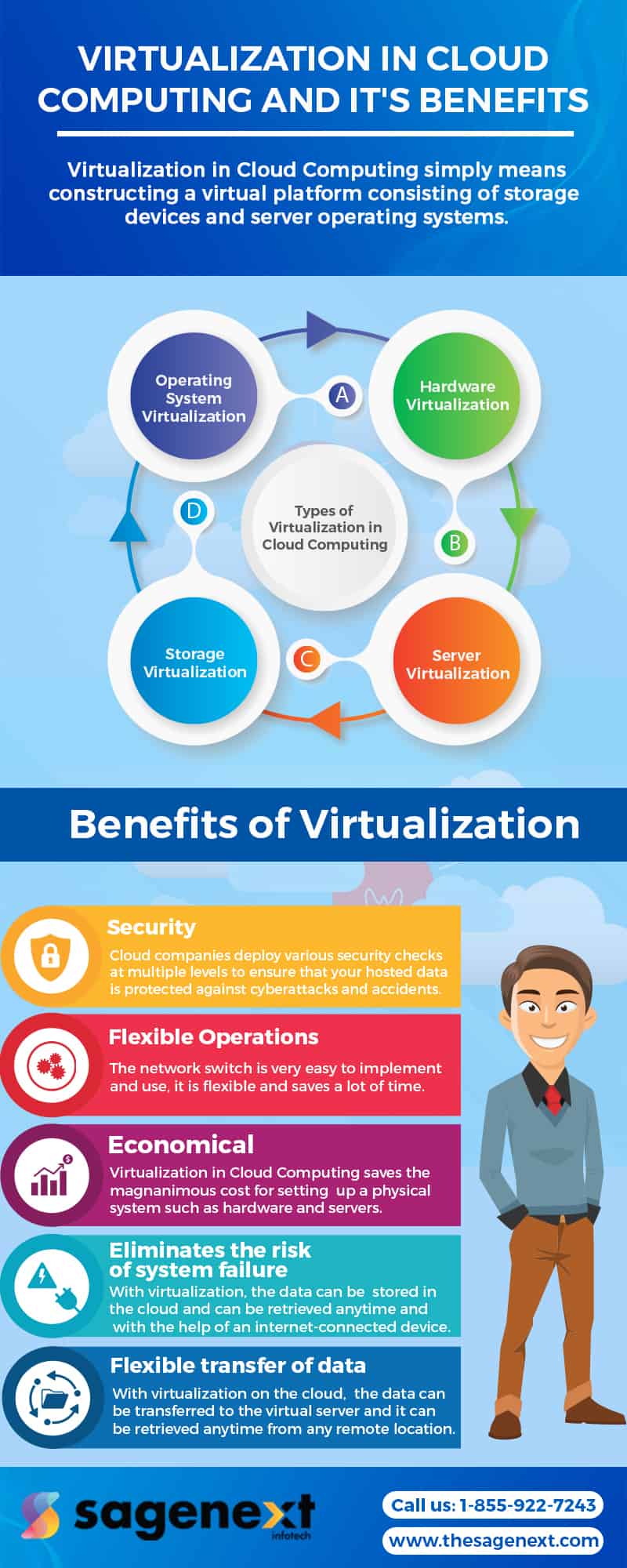
What Is Virtualization In Cloud Computing and Benefits
Cloud computing has been the rage in the modern business era. Businesses are progressively adapting to cloud computing and to cloud technology as a whole. While we are here on the topic of cloud computing let’s know a little about virtualization.
Virtualization in Cloud Computing simply means constructing a virtual platform comprising of storage devices and server operating systems. This not only helps the user by providing them multiple machines at the same time but it also allows sharing a single physical instance of resource or an application to multiple users. With cloud virtualization, you can also manage your workload in a way, as you can transform your traditional computing methods and make it more scalable, efficient, and economical.

One of the vital features of virtualization is that it allows you to share applications with multiple customers and companies.
Let’s learn a little about how Cloud virtualization works and the types of virtualization.
Types of Virtualization in Cloud Computing
- Operating System Virtualization
- Hardware Virtualization
- Server Virtualization
- Storage Virtualization
How Does Virtualization Work?
Virtualization in Cloud Computing actually means that a user can share all the data stored in the cloud with fellow users, it could be anything; software or an application. With this, you get a virtual environment in the cloud in the form of software or hardware. In virtualization, a third party or a cloud hosting company actually maintains and hosts the server and the software application for a monthly tariff and this generally doesn’t involve any upfront cost. It can also be put this way that with the help of Hypervisor I.E software, the customer can access the server. A hypervisor acts as a connecting link between the server and the virtual environment, distributing the resources between different virtual environments.
Benefits of Virtualization
1. Security
One of the most important concerns associated with the process of virtualization is security. Cloud hosting companies take care of this security aspect by providing firewalls, that help prevent unauthorized access and keep the data confidential.
Moreover, firewall and anti-malware keep the data protected from harmful viruses, malware, and other cyber threats. The hosting providers also render apt encryption that protects the data from other threads. This allows the customer to virtualize all the data stored and to create a backup on a server.
2. Flexible operations
The presence of a virtual network allows professionals to be more efficient and agile. The network switch is very easy to implement and use, it is flexible and saves a lot of time. With the help of virtualization in Cloud Computing, a number of technical problems can be solved in physical systems. Virtualization helps eliminate the problem of recovering the data from crashed or corrupted devices and hence one doesn’t have to fear data loss.
3. Economical
Virtualization in Cloud Computing saves the magnanimous cost for setting up a physical system such as hardware and servers. The cloud stores all the data in the virtual server, which proves to be quite economical for businesses. Virtualization in the cloud helps in reducing wastage and decreases the electricity bills along with drastically bringing down maintenance costs. As a lot of money is saved from not having to set up physical infrastructure, businesses can run multiple operating systems and apps on a particular server.
4. Eliminates the risk of system failure
There is always a chance that while performing some task, the system crashes down at the wrong time. Such a failure can cause damage to the company as it might lead to irreversible data loss, but with virtualization, you get to perform the same task in multiple devices at the same time. The data can be stored in the cloud and can be retrieved anytime and with the help of an internet-connect device. Moreover, when opting for virtualization, you get the benefit of multiple servers working simultaneously which makes the data accessible every time. Even one of the servers crash, the customer can access their data with the help of the 2nd server.
5. Flexible transfer of data
With virtualization on the cloud, the data can be transferred to the virtual server and it can be retrieved anytime from any remote location. It eliminates the need for fumbling around for hard drives in order to retrieve data. With the help of virtualization, locating the required data and transferring them to the desired authorities becomes a breeze. There is no limit on the data transfer, and it can be transferred to a long distance with the least possible charges. As these plans are easily scalable, additional storage can be added if the need arises.
Conclusion
Virtualization in cloud computing has taken the business world by a whirl. Especially the SMBs are the ones benefiting most out of it. It lets SMB owners enjoy the best of technology and ease of processing without having to shell out big bucks. Virtualization really accelerates the process by allowing multiple user access, collaborative working, and instant data access. Do check out our tariffs to see how economical it is to experience cloud virtualization. We offer all the versions of QuickBooks hosting as well as other popular tax software like Drake, Lacerte, etc.
 written by
written byAbout Author






